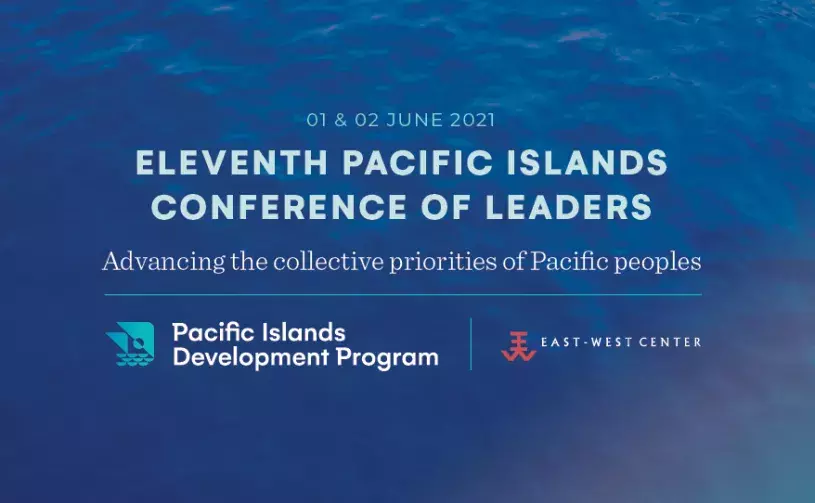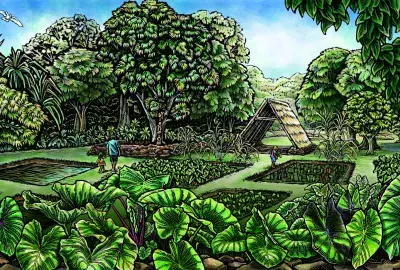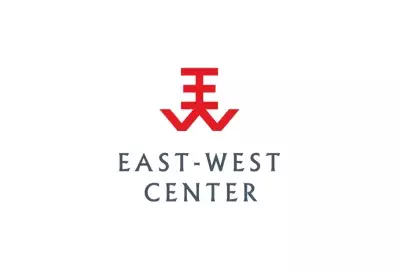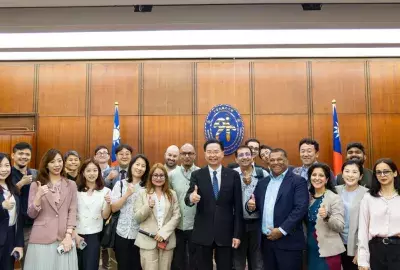Error message

OFFICE/DEPARTMENT
US Climate Envoy John Kerry tells leaders that with all-of-society effort it’s possible to both beat the climate crisis and transition to sustainable economies
HONOLULU (June 3, 2021) – The leaders of 11 nations and territories across the Pacific met yesterday for the final day of a two-day online gathering of the Pacific Islands Conference of Leaders (PICL). During the meeting, a new group of Pacific Island leaders recommitted to the important regional role of the PICL and its Secretariat, the Pacific Islands Development Program (PIDP) based at the East-West Center in Honolulu.
Discussion with US Climate Envoy John Kerry
In the final day’s main session, US Special Presidential Envoy for Climate John Kerry fielded questions from the leaders. Kerry told the group that the US remains committed to investing in funding and support for adaptation, mitigation, resilience, and sustainability efforts in the Pacific and globally. To deal with climate change, he said, “We have to have an all-of-society effort. I’m convinced that we can not only beat the climate crisis, but we can transition to a sustainable economy for all states including Pacific Islands. It’s doable, but we must be serious from 2020-2030, and the COP26 meeting will be critical to figure out how we get to net zero by 2050 to protect the planet for future generations.”
Leaders agree on key issues
In discussions during the meeting, the leaders agreed that their top priorities are to contain the COVID-19 pandemic and mitigate its long-term impacts, and to promote sustainable economic growth and development. Other shared priorities included expansion of access to information and communication technologies, the importance of regional harmony and diplomacy, and protection of ocean and natural resources. The leaders also highlighted PIDP’s important role in facilitating ongoing dialogue and action on these priorities, and in providing a bridge between the Pacific Islands and the United States and other international partners.
Closing Remarks by PICL Chair Panuelo
In closing remarks for the meeting, new PICL Chair His Excellency David W. Panuelo, President of the Federated States of Micronesia, said that the summit’s “frank, free-flowing exchange of ideas renews my confidence in the Pacific Way of seeking consensus and solidifying the sense of many coming together into one.” Noting that the PICL is the only regional body to include Pacific territories as well as independent nations, President Panuelo, who was unanimously elected to leadership of the body during the first day of the meeting, said: “Let inclusivity continue to be a lodestar by which the Pacific Islands Conference of Leaders navigates.”
Praising the leaders’ focus on climate change as the top security threat in the region, President Panuelo added, “At the end of the day, none of us could possibly go to bed and rest peacefully without giving our children and grandchildren the assurance that, as Pacific leaders, we are doing our very best to combat the existential threat of climate change.”
Future Meetings
During the summit, the leaders voted to hold future in-person meetings in 2022 and in 2025. Historically, the PICL has convened approximately every three years.
Leader Delegations
The leaders (or their designees) of the following countries and territories participated in the meeting
- Cook Islands
- Federated States of Micronesia
- Fiji
- French Polynesia
- Guam
- Hawai‘i
- Marshall Islands
- Niue
- Northern Mariana Islands
- Palau
- Solomon Islands
About the Pacific Islands Conference of Leaders:
The Pacific Islands Conference of Leaders (PICL) summit was founded in 1980 by Hawaiʻi Gov. George Ariyoshi and Fijian statesman Ratu Sir Kamisese Mara as a forum for Pacific Islands leaders—regardless of political status and without formal intergovernmental protocol—to address shared issues, learn from each other’s experiences, and develop common approaches to policy. The summit also provides opportunities for the leaders to dialogue with US officials and experts.
About the Pacific Islands Development Program:
The Pacific Islands Development Program (PIDP) conducts a broad range of activities to enhance the quality of life in the Pacific Islands. Based at the East-West Center in Honolulu, PIDP was formed in 1980 at the specific request of the region’s leaders to help advance their collective efforts to achieve and sustain equitable social and economic development. PIDP also serves as the Secretariat for the Pacific Islands Conference of Leaders and is a member of the Council of Regional Organisations of the Pacific (CROP).
About the East-West Center:
The East-West Center promotes better relations and understanding among the people and nations of the United States, Asia, and the Pacific through cooperative study, research, and dialogue. Established by the US Congress in 1960, the Center serves as a resource for information and analysis on critical issues of common concern, bringing people together to exchange views, build expertise, and develop policy options.
US Climate Envoy John Kerry tells leaders that with all-of-society effort it’s possible to both beat the climate crisis and transition to sustainable economies
HONOLULU (June 3, 2021) – The leaders of 11 nations and territories across the Pacific met yesterday for the final day of a two-day online gathering of the Pacific Islands Conference of Leaders (PICL). During the meeting, a new group of Pacific Island leaders recommitted to the important regional role of the PICL and its Secretariat, the Pacific Islands Development Program (PIDP) based at the East-West Center in Honolulu.
Discussion with US Climate Envoy John Kerry
In the final day’s main session, US Special Presidential Envoy for Climate John Kerry fielded questions from the leaders. Kerry told the group that the US remains committed to investing in funding and support for adaptation, mitigation, resilience, and sustainability efforts in the Pacific and globally. To deal with climate change, he said, “We have to have an all-of-society effort. I’m convinced that we can not only beat the climate crisis, but we can transition to a sustainable economy for all states including Pacific Islands. It’s doable, but we must be serious from 2020-2030, and the COP26 meeting will be critical to figure out how we get to net zero by 2050 to protect the planet for future generations.”
Leaders agree on key issues
In discussions during the meeting, the leaders agreed that their top priorities are to contain the COVID-19 pandemic and mitigate its long-term impacts, and to promote sustainable economic growth and development. Other shared priorities included expansion of access to information and communication technologies, the importance of regional harmony and diplomacy, and protection of ocean and natural resources. The leaders also highlighted PIDP’s important role in facilitating ongoing dialogue and action on these priorities, and in providing a bridge between the Pacific Islands and the United States and other international partners.
Closing Remarks by PICL Chair Panuelo
In closing remarks for the meeting, new PICL Chair His Excellency David W. Panuelo, President of the Federated States of Micronesia, said that the summit’s “frank, free-flowing exchange of ideas renews my confidence in the Pacific Way of seeking consensus and solidifying the sense of many coming together into one.” Noting that the PICL is the only regional body to include Pacific territories as well as independent nations, President Panuelo, who was unanimously elected to leadership of the body during the first day of the meeting, said: “Let inclusivity continue to be a lodestar by which the Pacific Islands Conference of Leaders navigates.”
Praising the leaders’ focus on climate change as the top security threat in the region, President Panuelo added, “At the end of the day, none of us could possibly go to bed and rest peacefully without giving our children and grandchildren the assurance that, as Pacific leaders, we are doing our very best to combat the existential threat of climate change.”
Future Meetings
During the summit, the leaders voted to hold future in-person meetings in 2022 and in 2025. Historically, the PICL has convened approximately every three years.
Leader Delegations
The leaders (or their designees) of the following countries and territories participated in the meeting
- Cook Islands
- Federated States of Micronesia
- Fiji
- French Polynesia
- Guam
- Hawai‘i
- Marshall Islands
- Niue
- Northern Mariana Islands
- Palau
- Solomon Islands
About the Pacific Islands Conference of Leaders:
The Pacific Islands Conference of Leaders (PICL) summit was founded in 1980 by Hawaiʻi Gov. George Ariyoshi and Fijian statesman Ratu Sir Kamisese Mara as a forum for Pacific Islands leaders—regardless of political status and without formal intergovernmental protocol—to address shared issues, learn from each other’s experiences, and develop common approaches to policy. The summit also provides opportunities for the leaders to dialogue with US officials and experts.
About the Pacific Islands Development Program:
The Pacific Islands Development Program (PIDP) conducts a broad range of activities to enhance the quality of life in the Pacific Islands. Based at the East-West Center in Honolulu, PIDP was formed in 1980 at the specific request of the region’s leaders to help advance their collective efforts to achieve and sustain equitable social and economic development. PIDP also serves as the Secretariat for the Pacific Islands Conference of Leaders and is a member of the Council of Regional Organisations of the Pacific (CROP).
About the East-West Center:
The East-West Center promotes better relations and understanding among the people and nations of the United States, Asia, and the Pacific through cooperative study, research, and dialogue. Established by the US Congress in 1960, the Center serves as a resource for information and analysis on critical issues of common concern, bringing people together to exchange views, build expertise, and develop policy options.







